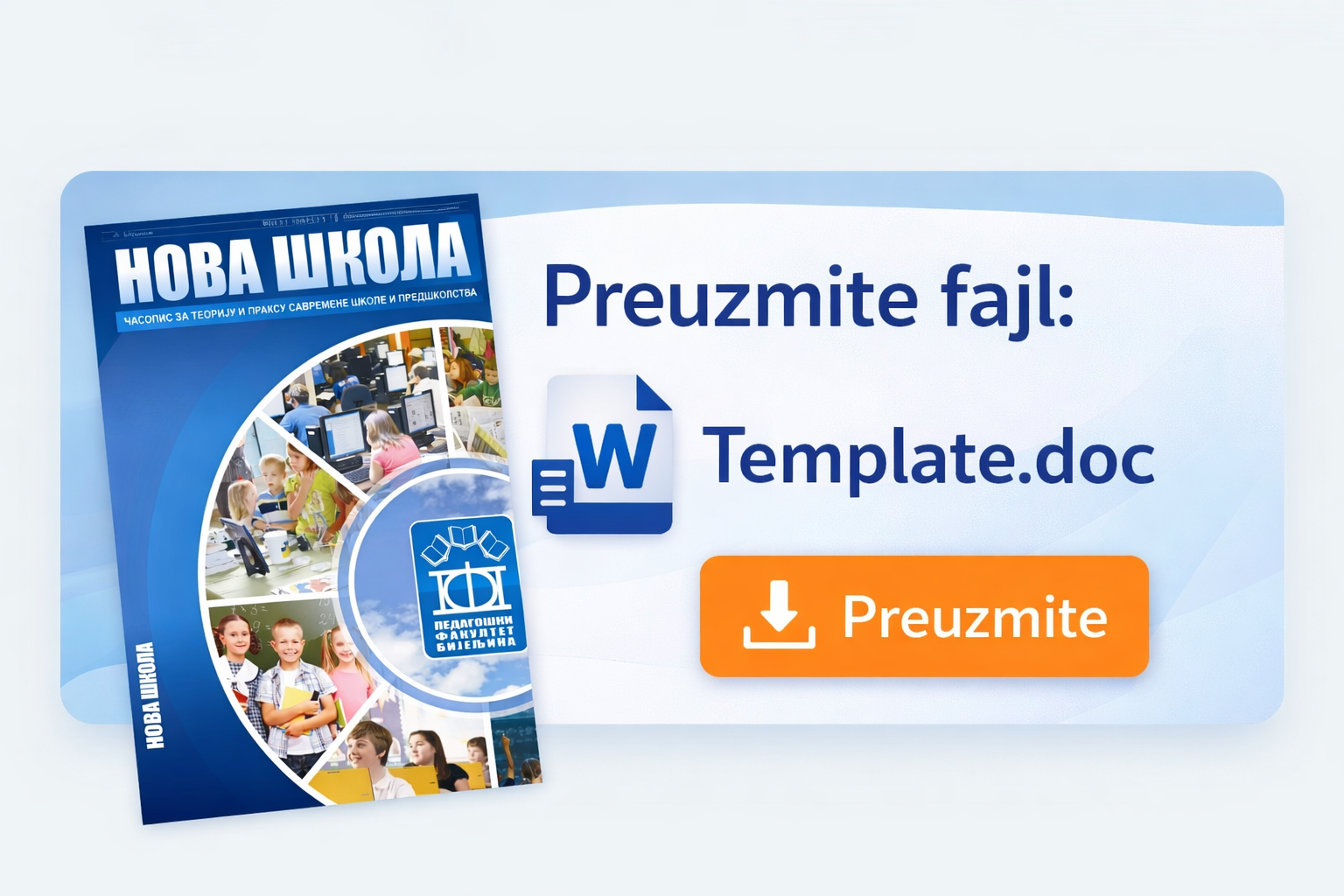EFFECTS OF COOPERATIVE LEARNING IN THE TEACHING OF MY ENVIRONMENT IN THE THIRD GRADE OF PRIMARY SCHOOL
DOI:
https://doi.org/10.7251/NSK2520075PKeywords:
cooperative learning, teaching of my environment, effects of cooperative learning, models of cooperative learningAbstract
In modern theory and practice, the weakness and lack of traditional teaching of the subject My Environment is often highlighted, and the need to improve the educational process as a whole is highlighted. One of the productive ways of realizing teaching content of the subject is the application of cooperative learning. The aim of this research is to examine the effects of cooperative learning in the third grade of elementary school in teaching My Environment. The experimental research was conducted on a sample of 186 third-grade students. The obtained results indicate that students, by applying the cooperative learning model in teaching My Environment in the third grade of elementary school, achieve better results on average on knowledge tests than students in the traditional teaching of “My environment”. The teachers’ attitudes towards the application of the cooperative learning model in teaching My environment subject were examined by using a questionnaire. The total sample of teachers who participated in the research was 100. The research included elementary school teachers who teach from 1st to 5th grade in Banja Luka, Srbac and Prnjavor municipalities.
Downloads
References
Бањац, М. (2011). Основе наставе природе и друштва. Бања Лука: Нове образовне иницијативе.
Bezić, K. (1973). Metodika nastave prirode i društva. Zagreb: Školska knjiga.
Bjelanović, D. Ž. (2012). Neke metode za razvoj kritičkog mišljenja učenika po ERR sustavu. Metodički ogledi, časopis za filozofiju odgoja Hrvatskog društva, 19, 163–179.
Boras, M. (2009). Suvremeni pristupi nastavi prirode i društva [Elektronska verzija]. Život i škola, 21, 40–49.
Бранковић, Д. и Илић, М. (2003). Основи педагогије. Бања Лука: Комесграфика.
Vujaklija, M. (1980). Leksikon stranih reči i izraza. Beograd: Prosveta
Giesecke, H. (1985). Uvod u opštu pedagogiju, Zagreb: Educa.
De Zan, I. (2005). Metodika nastave prirode i društva. Zagreb:Školska knjiga.
Džaferagić-Franca, A. i Tomić, R. (2012). Kooperativno učenje u nastavi mlađih razreda osnovne škole,Metodički obzori,časopis za teoriju i praksu odgoja i obrazovanja, 7/2, 107–116.
Ивић, И., Пешикан, А. и Антић, С. (2003). Активно учење 2. Београд: Институт за психологију.
Илић, М. (2005). Иновативни модели вјежби у универзитетској настави. У књизи: Иновације универзитетској настави (стр. 47-119). Бања Лука: Филозофски факултет.
Илић, М. (2016). Значај и тешкоће у примени кооперативног учења уразредној настави из перспективе наставника. Настава и васпитање, 65(1),167– 180.
Илић, М. (2016). Учесталост и могућности примене кооперативног учења у разредној настави. Иновације у настави, 29(2), 25–37
Ивић, И., Пешикан, А. и Антић, С. (2003). Активно учење 2. Београд: Институт за психологију.
Јењић, С. (2013). Oблици и реализација изванучионичке наставе природе и друштва. Радови, часопис за хуманистичке и друштвене науке, 18, 163–173.
Kadum-Bošnjak, S. (2012). Suradničko učenje. Metodički ogledi, časopis za filozofiju odgoja Hrvatskog društva, 19, 181–199.
Miljević-Riđički, R., Maleš, D. i Rijavec, M. (2000). Odgoj za razvoj. Zagreb: Alinea
Mirkov, S. i Lalić, N. (2006). Metakognitivne strategije i kooperativno učenje u obuci za rad na kompjuteru. Nastava i vaspitanje,časopis za pedagošku teoriju i praksu, 55/1, 34– 46.
Мишчевић-Кадијевић, Г. (2009). Кооперативни приступ у настави и трајност ученичких знања. Настава и васпитање, часопис за педагошку теорију и праксу, 58/4, 499–508.
Мишчевић-Кадијевић, Г. (2009). Утицај различитих облика рада на усвајање деклеративних и процедуралних знања ученика. У Зборнику Института за педагошка истраживања (стр. 383–400). Београд: Институт за педагошка истраживања.
Pedagoška enciklopedija 1 (1989). Beograd: Zavod za udžbenike i nastavna sredstva.
Pedagoški leksikon (1996). Beograd: Zavod za udžbenike i nastavna sredstva.
Рот, Н. (1983). Психологија група. Београд: Завод за уџбенике.
Станојевић, Д. (2005). Ефекти кооперативног учења у паровима у разредној настави [Elektronska verzija]. Иновације у настави, 1, 71–81.
Станојевић, Љ. Д. и Мишић, Б. Љ. (2015). Кооперативно учење-пут до самоактуелизације ученика као основе и циља васпитања. У Зборнику посебна издања научни скупови Наука и слобода (стр. 791–810). Пале: Филозофски факултет.
Стојаковић, П. (2002). Психологија за наставнике. Бања Лука: Графид.
Сузић, Н. (2000). Утицај кооперативног учења на развој интерперсоналних способности и емоционалности. У књизи Интерактивно учење II (стр. 9–46) Бањалука: Министарство просвјете Републике Српске.
Suzić, N. (2005). Pedagogija za XXI vijek. Banja Luka: Grafomark.
Тrebješanin, Ž. i Lalović, Z. (2011). Pojedinac u grupi. Podgorica: Zavod za udžbenike i nastavna sredstva.
Ћурчић, М. и Ждерић, М. (2000). Методика наставе природе и друштва. Бијељина: Учитељски факултет у Бијељини.
Uzelac, M., Bognar, L., Bagić, A. (1994). Budimo prijatelji –pedagoške radionice za djecu od 6-14 godina, Zagreb: Slon.
Ševkušić, S. (1993). Kooperativno učenje u razredu. U Zborniku Instituta za pedagoška istraživanja (str.73-86). Beograd: Institut za pedagoška istraživanja.
Ševkušić, S.(1995). Teorijske osnove i perspektive kooperativnog učenja. U Zborniku Instituta za pedagoška istraživanja (str.138–157). Beograd: Institut za pedagoška istraživanja.
Шевкушић, С. (2003). Креирање услова за кооперативно учење. У Зборнику Института за педагошка истраживања (стр.96–119). Београд: Институт за педагошка истраживања.



